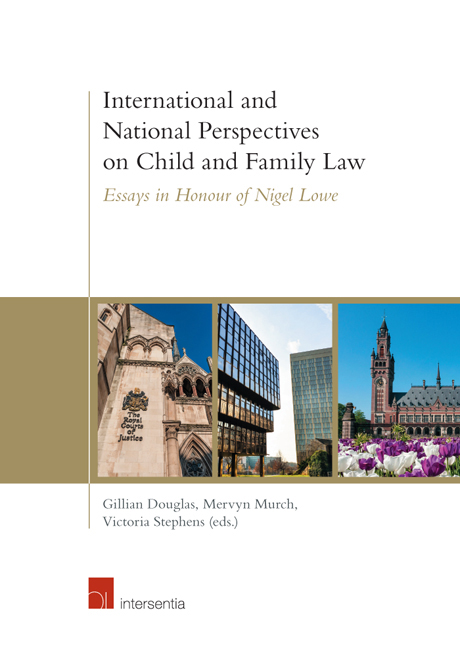Book contents
- Frontmatter
- Foreword
- Acknowledgements
- Contents
- List of Cases
- List of Contributors
- Introduction: Nigel Vaughan Lowe: An Appreciation
- Part I Family and Child Law in England and Wales
- Part II International Family Law
- Judging Parental Child Abduction: What Does it Mean to Adopt a Children's Rights-Based Approach?
- Judicial Activism: A 20-Year Evolution
- Globalisation of Adjudication in International Family Law: Serving International Families by Producing International Solutions
- Creating International Families: Private International Law and the Industry of Parenthood
- Issues in International Divorce Cases
- Non-Judicial Divorce in France: Progress or a Mess?
- The Istanbul Convention: Is Domestic Abuse Violence Against Women?
- Nationality and Migration Status in International Children's Law
- The Development of Child Protection Across International Borders for Children at Risk of Harm
- Nigel Lowe and International Family Law: An Immense Contribution
- The Spanish Constitutional Court and Protracted Child Abduction Proceedings: Time is of the Essence
- Non-Recognition of Child Marriages: Sacrificing the Global for the Local in the Aft ermath of the 2015 ‘Refugee Crisis’
- Juvenile Justice in Bulgaria: Reforms and Resistance
- Overriding Mandatory Provisions in EU Family Law Regulations
- Part III The Future for Family and Child Law
The Development of Child Protection Across International Borders for Children at Risk of Harm
from Part II - International Family Law
Published online by Cambridge University Press: 12 October 2018
- Frontmatter
- Foreword
- Acknowledgements
- Contents
- List of Cases
- List of Contributors
- Introduction: Nigel Vaughan Lowe: An Appreciation
- Part I Family and Child Law in England and Wales
- Part II International Family Law
- Judging Parental Child Abduction: What Does it Mean to Adopt a Children's Rights-Based Approach?
- Judicial Activism: A 20-Year Evolution
- Globalisation of Adjudication in International Family Law: Serving International Families by Producing International Solutions
- Creating International Families: Private International Law and the Industry of Parenthood
- Issues in International Divorce Cases
- Non-Judicial Divorce in France: Progress or a Mess?
- The Istanbul Convention: Is Domestic Abuse Violence Against Women?
- Nationality and Migration Status in International Children's Law
- The Development of Child Protection Across International Borders for Children at Risk of Harm
- Nigel Lowe and International Family Law: An Immense Contribution
- The Spanish Constitutional Court and Protracted Child Abduction Proceedings: Time is of the Essence
- Non-Recognition of Child Marriages: Sacrificing the Global for the Local in the Aft ermath of the 2015 ‘Refugee Crisis’
- Juvenile Justice in Bulgaria: Reforms and Resistance
- Overriding Mandatory Provisions in EU Family Law Regulations
- Part III The Future for Family and Child Law
Summary
INTRODUCTION
In 2004, Professor Lowe, with Everall and Nicholls, noted that international disputes over children had seen a ‘noticeable and welcome increase in judicial cooperation.’ Children's cases needed ‘bold and decisive action’ to ensure decisions were made with the minimum of delay and uncertainty. The field of international family law, and the study of the development and use of the law have been heavily shaped and influenced by the contribution of Professor Lowe. These statements proved prescient of the future developments of international disputes relating to children. The increasing number of disputes and the volume of case law and legislation originating from the European Union (EU) and Hague Conference on Private International Law have required new approaches to resolving disputes. The activity of the EU in particular has encouraged greater increase in judicial cooperation and trust, facilitated and supported by the valuable contributions from Professor Lowe's research.
In 2004, International Movement of Children raised the question of jurisdiction in England and Wales over public law proceedings with an international dimension. This was raised as an issue in relatively few cases by this time, but the Family Law Act 1986 contained no jurisdictional rules for such cases, applying as it did only to private law proceedings. Where a child at risk had a link to another jurisdiction, it was unclear what should be the jurisdiction rule to enable the English child protection system to intervene to protect a child. However, the impact of the Brussels IIA Regulation has meant that children who are habitually resident in England and Wales are subject to English public law care proceedings if identified as being at risk of serious harm. The adoption of the EU measures has provided greater certainty in the assumption of jurisdiction and, as suggested above, has also encouraged closer cooperation between judicial authorities in the Member States. Whilst the rules adopted in the Brussels IIA have provided some clarity on the ground of jurisdiction in public law cases, the circumstances in which private international family law rules may be used in disputes have become increasingly complex. This chapter will consider the circumstances in which public law assumes an international dimension, and the way in which these disputes are resolved.
- Type
- Chapter
- Information
- International and National Perspectives on Child and Family LawEssays in Honour of Nigel Lowe, pp. 233 - 246Publisher: IntersentiaPrint publication year: 2018



